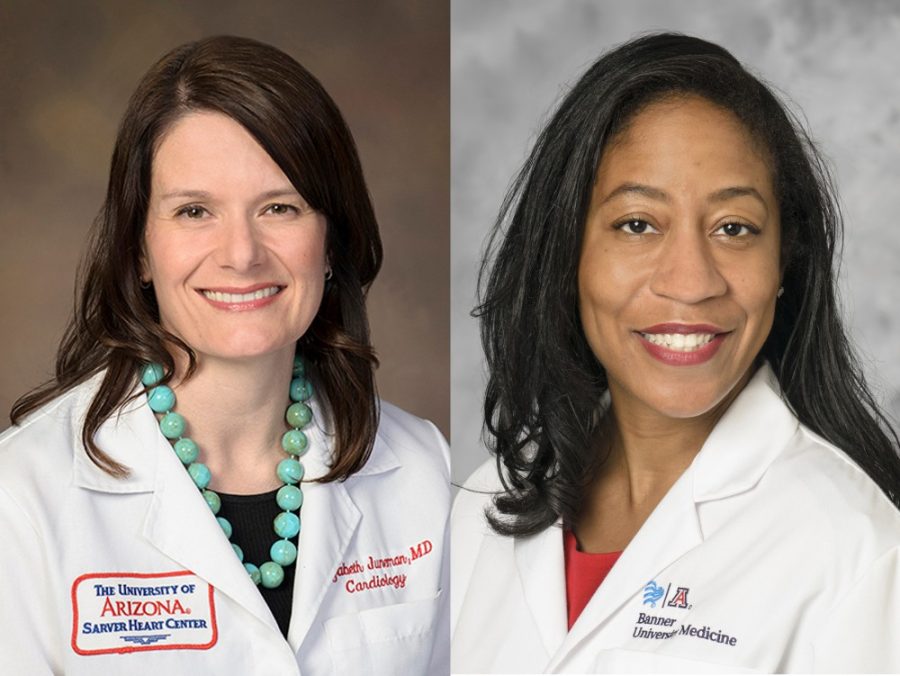The University of Arizona Sarver Heart Center has organized the Heart of Women’s Health luncheon on Friday, Nov. 3 at the Skyline Country Club. A panel of speakers will address women’s heart health and the importance of going “beyond the bikini.”
One of the two featured speakers at this event will be Elizabeth Juneman, associate professor of medicine at the UA College of Medicine. Juneman has special interest in the relationship between women and heart disease.
The second speaker is Khadijah Breathett, assistant professor of medicine at the UA. She conducts population research focusing on race and gender disparities in health care among patients with heart disease.
The moderator of this event is Nancy Sweitzer, professor of medicine, chief of cardiology and director at the UA Sarver Heart Center.
One of the main topics the speakers will be addressing is going “beyond the bikini.”
“Much of women’s health care, especially for younger women — age 20 plus — focuses on a woman’s reproductive organs and breast cancer screening,” Juneman said. “Yet one out of three women in the United States will die from heart disease each year, compared to one in 32 who will die from breast cancer.”
RELATED: Father cautions UA medical and graduate students to not be blinded by prestige or money
Breathett said this issue has not been in the forefront of women’s health in the past.
“Historically, heart disease wasn’t seen as a woman’s issue, [but] we now know this is outdated thinking,” Breathett said. “Despite increases in awareness, only 45 percent of women recognize that heart disease is their number-one killer.”
While Juneman and her colleagues said they believe it is important to screen for breast cancer, they feel that screening for heart disease is a matter of life and death, even for young women, and is often overlooked.
This luncheon will also feature some very different stories about heart health, according to Katie Maass, director of communications and public education at the UA Sarver Heart Center.
“[When] McKenzie Meza was 5 days old, she underwent open-heart surgery and was treated by surgeons and cardiologists at UA Sarver Heart Center who saved her life,” Maass said. “Today, she is thriving as senior at Salpointe Catholic High School, where she is on the volleyball team.”
Meza, who was accepted into the UA class of 2022 and given the Wildcat Excellence award, will be sharing her story at the luncheon.
She will be joined by Wanda Moore, who is the head of the UA Sarver Heart Center Community Coalition for Heart Health Education.
“As an African American woman … Wanda Moore is very aware that she is in one of the highest risk groups of dying from heart disease,” Maass said. “Despite her healthy, active lifestyle, she developed coronary artery disease and had to have bypass surgery in 2015.”
RELATED: Getting trashed without trashing the planet?
Additionally, Sweitzer will present the Mary Anne Fay Heart Health Advocate Award to the founder of the UA Sarver Heart Center Women’s Heart Health Education Committee, Gordon Ewy, director emeritus of the UA Sarver Heart Center and professor emeritus of the UA College of Medicine.
Maass said that the UA Sarver Heart Center has a 13-year track record of educating women about the importance of heart health. This event allows the community and faculty to work together to promote awareness of this disease.
Breathett said heart disease takes the life of one woman every minute and 19 seconds. That totals 399,189 deaths per year.
“Patients can improve their health if they are willing to modify lifestyle, get regular check-ups, know [their] numbers, control blood pressure and cholesterol, reduce blood sugar, eat better, lose weight, get active and stop smoking,” Breathett said. “Be your own advocate. If you have heart disease, form a partnership with your provider to manage your heart disease.”
Registration to this event is $35 per person. You can register online through Oct. 30 at http://heart.arizona.edu/WomenLuncheon. Doors open at 11 a.m., and the luncheon will conclude at 1 p.m.
“We want women to be aware that one out of three are likely to die from heart disease and that their sex and race may place them at increased risk of experiencing disparities in the health care system,” Breathett said. “We want to empower women to be educated advocates for their health by knowing how to prevent and manage risk factors for heart disease.”
Follow Chandler Donald on Twitter









